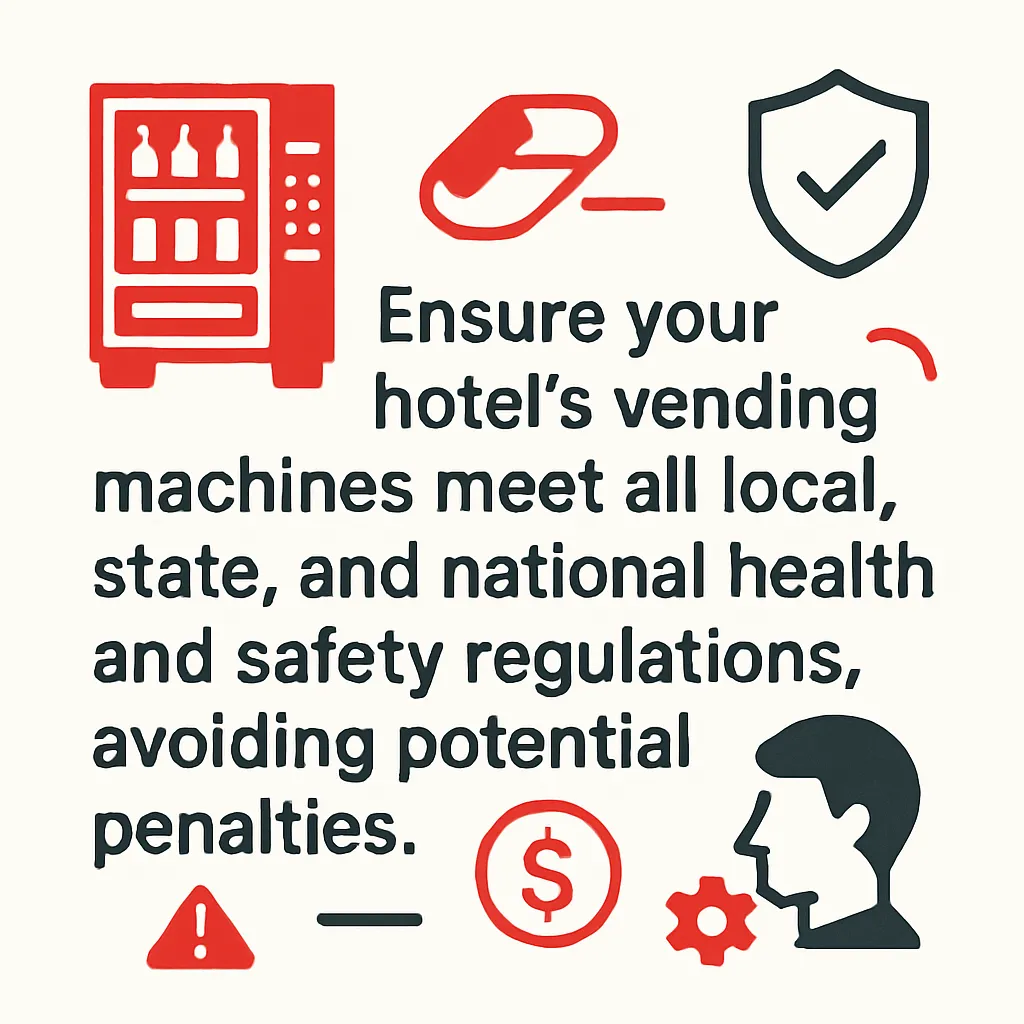Regulatory Compliance for Hotel Vending Machines
Ensure your hotel's vending machines meet all local, state, and national health and safety regulations, avoiding potential penalties.
Back to Vending for Hotels ResourcesEnsure your hotel's vending machines meet all local, state, and national health and safety regulations, avoiding potential penalties.
Back to Vending for Hotels ResourcesOperating vending machines in a hotel environment requires strict adherence to numerous regulations, from food safety to accessibility. Understanding and managing these requirements is essential for smooth operations and guest satisfaction.
![]() Ensure health code compliance for all vended food and beverages
Ensure health code compliance for all vended food and beverages
![]() Meet ADA standards to provide accessible service for all guests
Meet ADA standards to provide accessible service for all guests
![]() Handle necessary licensing and permits to operate legally
Handle necessary licensing and permits to operate legally

For hotels, providing convenient access to snacks and beverages through vending machines is a popular amenity that enhances guest experience. However, operating these machines comes with a critical responsibility: ensuring full compliance with a complex web of local, state, and national regulations. Navigating these requirements effectively is key to avoiding penalties and maintaining a seamless operation.
One of the foremost concerns for hotel vending machines involves health and food safety. Machines dispensing perishable items must adhere to strict temperature control guidelines to prevent spoilage and contamination. Regular cleaning schedules, proper labeling of ingredients, and clear identification of allergens are non-negotiable. Hotels must partner with vending service providers that demonstrate a thorough understanding of these codes and actively implement best practices to maintain sanitation and compliance for all food-related vending. This proactive approach safeguards guest health and protects the hotel's reputation.
In today's inclusive environment, accessibility is paramount. Hotel vending machines must comply with the Americans with Disabilities Act (ADA), ensuring they are usable by guests with various disabilities. This often means providing machines with accessible payment methods, clear controls at appropriate heights, and sufficient clear floor space for wheelchair access. Partnering with vendors who offer ADA-compliant vending choices ensures all guests can utilize the amenity comfortably.
Beyond health and accessibility, hotels frequently face local business licensing and specific vending permits. These requirements vary significantly by municipality and state. It is essential for hotel management to research and secure all necessary documentation before placing vending machines into service. Furthermore, an understanding of vending contract terms, including commission structures and termination clauses, is vital. For guidance on navigating these agreements, consider reviewing resources like questions to ask before signing a vending contract.
Effective regulatory compliance isn’t a one-time check; it requires ongoing vigilance. Hotels should work closely with their vending service providers to establish clear protocols for restocking, maintenance, and regular compliance audits. This partnership ensures that machines are consistently stocked with fresh, unexpired products, all systems are functioning correctly, and any new regulations are quickly addressed. A transparent relationship with a reliable vending partner is the cornerstone of hassle-free, compliant vending machine operations.
Hotels must ensure compliance with health codes for food safety, ADA accessibility standards, and local business licensing requirements for vending operations.
Health codes mandate proper temperature control for perishable items, regular cleaning schedules, and correct labeling of ingredients and allergens in vending machines.
Yes, vending machines in public accommodations like hotels must meet ADA guidelines, including accessible payment mechanisms and product selection heights for guests with disabilities.
Hotels typically need to obtain general business licenses, and sometimes specific permits for food service or vending operations, which vary by local jurisdiction.
Depending on local and state regulations, and the types of products sold, hotels may be required to display nutritional information for vended items, especially for unpackaged foods.
Regular inventory rotation, proper supply chain management, and clear communication with vending service providers are crucial to prevent expired products from being sold.
Selling alcohol through vending machines is heavily regulated and often prohibited or requires specialized, age-verification technology and strict licensing, varying significantly by location.
Penalties can range from fines and warnings to machine shutdowns or even suspension of business permits, depending on the severity and nature of the violation.
Absolutely. A comprehensive written policy helps ensure all staff involved are aware of and adhere to regulatory requirements, maintenance schedules, and customer service protocols.
Regular internal inspections by hotel staff, in addition to periodic checks by vending service providers and scheduled external health and safety audits, are recommended to maintain continuous compliance.